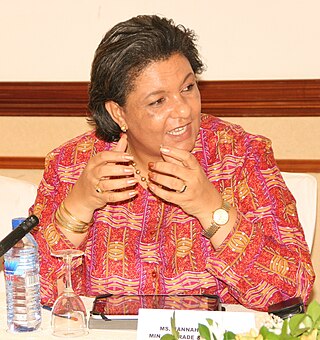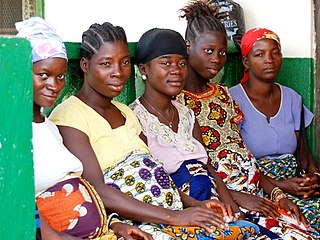Related Research Articles
Reproductive rights are legal rights and freedoms relating to reproduction and reproductive health that vary amongst countries around the world. The World Health Organization defines reproductive rights as follows:
Reproductive rights rest on the recognition of the basic right of all couples and individuals to decide freely and responsibly the number, spacing and timing of their children and to have the information and means to do so, and the right to attain the highest standard of sexual and reproductive health. They also include the right of all to make decisions concerning reproduction free of discrimination, coercion and violence.

Lesbian, gay, bisexual, and transgender (LGBT) people in Ghana face legal and societal challenges and discrimination not experienced by non-LGBT citizens.

HIV/AIDS is one of the most serious health concerns in South Africa. The country has the highest number of people afflicted with HIV of any country, and the fourth-highest adult HIV prevalence rate, according to the 2019 United Nations statistics.
Thomas John Bisika is a social demographer and public health specialist, diplomat, and former health systems specialist at World Health Organization in Nigeria.He is the current Malawi High Commissioner to the United Kingdom.

The status of women in Ghana and their roles in Ghanaian society has changed over the past few decades. There has been a slow increase in the political participation of Ghanaian women throughout history. Women are given equal rights under the Constitution of Ghana, yet disparities in education, employment, and health for women remain prevalent. Additionally, women have much less access to resources than men in Ghana do. Ghanaian women in rural and urban areas face slightly different challenges. Throughout Ghana, female-headed households are increasing.
Violence against women in Peru is defined as harassment or violence propagated against those who are born women. Intimate partner violence (IPV) is the most common form of gender-based violence that occurs though it can occur concurrently with sexual and emotional violence.

As sexual violence affects all parts of society, the responses that arise to combat it are comprehensive, taking place on the individual, administrative, legal, and social levels.

Domestic violence is violence or other abuse that occurs in a domestic setting, such as in a marriage or cohabitation. Domestic violence is often used as a synonym for intimate partner violence, which is committed by one of the people in an intimate relationship against the other person, and can take place in relationships or between former spouses or partners. In its broadest sense, domestic violence also involves violence against children, parents, or the elderly. It can assume multiple forms, including physical, verbal, emotional, economic, religious, reproductive, financial abuse, or sexual abuse. It can range from subtle, coercive forms to marital rape and other violent physical abuse, such as choking, beating, female genital mutilation, and acid throwing that may result in disfigurement or death, and includes the use of technology to harass, control, monitor, stalk or hack. Domestic murder includes stoning, bride burning, honor killing, and dowry death, which sometimes involves non-cohabitating family members. In 2015, the United Kingdom's Home Office widened the definition of domestic violence to include coercive control.

HIV/AIDS in Lesotho constitutes a very serious threat to Basotho and to Lesotho's economic development. Since its initial detection in 1986, HIV/AIDS has spread at alarming rates in Lesotho. In 2000, King Letsie III declared HIV/AIDS a natural disaster. According to the Joint United Nations Programme on HIV/AIDS (UNAIDS) in 2016, Lesotho's adult prevalence rate of 25% is the second highest in the world, following Eswatini.
HIV/AIDS in Namibia is a critical public health issue. HIV has been the leading cause of death in Namibia since 1996, but its prevalence has dropped by over 70 percent in the years from 2006 to 2015. While the disease has declined in prevalence, Namibia still has some of the highest rates of HIV of any country in the world. In 2016, 13.8 percent of the adult population between the ages of 15 and 49 are infected with HIV. Namibia had been able to recover slightly from the peak of the AIDS epidemic in 2002. At the heart of the epidemic, AIDS caused the country's live expectancy to decline from 61 years in 1991 to 49 years in 2001. Since then, the life expectancy has rebounded with men living an average of 60 years and women living an average of 69 years

In precolonial Ghana, infectious diseases were the main cause of morbidity and mortality. The modern history of health in Ghana was heavily influenced by international actors such as Christian missionaries, European colonists, the World Bank, and the International Monetary Fund. In addition, the democratic shift in Ghana spurred healthcare reforms in an attempt to address the presence of infectious and noncommunicable diseases eventually resulting in the formation of the National Health insurance Scheme in place today.

The Democratic Republic of the Congo, and the east of the country in particular, has been described as the "Rape Capital of the World", and the prevalence and intensity of all forms of sexual violence has been described as the worst in the world. Human Rights Watch defines sexual violence as "an act of a sexual nature by force, or by threat of force or coercion", and rape as "a form of sexual violence during which the body of a person is invaded, resulting in penetration, however slight, of any part of the body of the victim, with a sexual organ, or of the anal or genital opening of the victim with any object or other part of the body."
The Naz Foundation (India) Trust is a non-governmental organisation (NGO) in that country that works on HIV/AIDS and sexual health. It is based in the Indian capital of New Delhi.

Lesbian, gay, bisexual, and transgender (LGBT) people in the Marshall Islands may face legal challenges not experienced by non-LGBT residents. Same-sex sexual activity has been legal in the Marshall Islands since 2005, and discrimination on the basis of sexual orientation and gender identity has been outlawed in all areas since 2019. Despite this, households headed by same-sex couples are not eligible for the same legal protections available to opposite-sex married couples, as same-sex marriage and civil unions are not recognized.
Human trafficking in Nepal is a growing criminal industry affecting multiple other countries beyond Nepal, primarily across Asia and the Middle East. Nepal is mainly a source country for men, women and children subjected to the forced labor and sex trafficking. U.S. State Department's Office to Monitor and Combat Trafficking in Persons placed the country in "Tier 2" in 2017.
Women in Cambodia, due to the influence of the dominant Khmer culture, are traditionally expected to be modest and soft-spoken. They are to be well-mannered, industrious, and hold a sense of belonging to the household. It is expected that they act as the family's caregivers and caretakers, financial administrators, and serve as the "preserver of the home". As financial administrators, women can be identified as having household authority at the familial level. Khmer women are expected to maintain virginity until marriage, become faithful wives, and act as advisors to their husbands. Women in Cambodia have also be known as “light” walkers-- "light" walking and refinement of the Khmer women is further described as being "quiet in […] movements that one cannot hear the sound of their silk skirt rustling".

The extent of gender inequalities varies throughout Liberia in regard to status, region, rural/urban areas, and traditional cultures. In general, women in Liberia have less access to education, health care, property, and justice when compared to men. Liberia suffered two devastating civil wars from 1989–1996 and 1999–2003. The wars left Liberia nearly destroyed with minimal infrastructure and thousands dead. Liberia has a Human Development Report ranking of 174 out of 187 and a Gender Inequality Index rank of 154 out of 159.

Domestic violence in same-sex relationships or intragender violence is a pattern of violence or abuse that occurs within same-sex relationships. Domestic violence is an issue that affects people of any sexuality, but there are issues that affect victims of same-sex domestic violence specifically. These issues include homophobia, internalized homophobia, HIV and AIDS stigma, STD risk and other health issues, lack of legal support, and the violence they face being considered less serious than heterosexual domestic violence. Moreover, the issue of domestic violence in same-sex relationships has not been studied as comprehensively as domestic violence in heterosexual relationships. However, there are legal changes being made to help victims of domestic violence in same-sex relationships, as well as organizations that cater specifically to victims of domestic violence in same-sex relationships.
Dorcas Ama Frema Coker-Appiah is a Ghanaian lawyer and women's rights activist, and the executive director of the Gender Studies and Human Rights Documentation Centre, also known as the "Gender Centre", in Accra, Ghana. She has had important roles in several organisations promoting women's rights at national, regional and international levels.

Naana Otoo-Oyortey is an Ghanaian social activist, the executive director of the Foundation for Women's Health, Research and Development.
References
- ↑ "Staff". gendercentreghana.org. Retrieved 9 November 2017.
- ↑ "The 2nd Ghana Feminist Forum: A Personal Perspective - African Feminist Forum". africanfeministforum.com. 29 August 2011. Retrieved 9 November 2017.
- ↑ Both works can be purchased through the Gender Centre by contacting them through their website
- ↑ "Gender Studies & Human Right Documentation Centre". www.gendercentreghana.org. Retrieved 9 November 2017.
- ↑ http://www.gendercentreghana.org/activitydetail.php?id=1 Archived 26 July 2011 at the Wayback Machine Retrieved 23 April 2010.
- ↑ http://www.gendercentreghana.org/activitydetail.php?id=2 Archived 26 July 2011 at the Wayback Machine Retrieved 23 April 2010.
- ↑ http://www.gendercentreghana.org/activitydetail.php?id=6 Archived 26 July 2011 at the Wayback Machine Retrieved 23 April 2010.
- ↑ Gender Norms, Domestic Violence and Women's Vulnerability to HIV/AIDS. Gender Studies and Human Rights Documentation Centre.
- ↑ http://www.aed.org/ Archived 12 February 2012 at the Wayback Machine Retrieved 27 April 2010.
- ↑ cedepghana.tripod.com http://cedepghana.tripod.com/ . Retrieved 27 April 2010.
{{cite web}}: Missing or empty|title=(help)[ title missing ] - ↑ http://www.ghanatuc.org/organisations.php Archived 31 October 2011 at the Wayback Machine Retrieved 27 April 2010
- ↑ "Contact Us | Gender Centre". Archived from the original on 28 December 2011. Retrieved 17 May 2010.